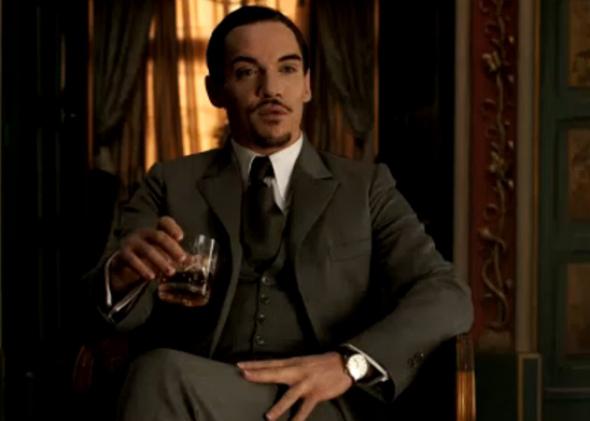It is entirely reflective of NBC’s current dire predicament that it is seeking to capitalize on the vampire trend only now, long after Buffy’s Angel, Twilight’s Edward Cullen, The Vampire Diaries’ Salvatore Brothers, and many others have turned the vampire-who-is-tortured-and-hot-for-a-mortal-girl-he-would-like-to-nibble-on-in-all-ways into a cliché. And yet, NBC’s Dracula, loosely based on Bram Stoker’s OG lascivious bloodsucker, premieres tonight. NBC is hoping that audiences’ thirst for vampires is an unquenchable as vampires’ thirst for blood, but I, anyway, am sated and eager for any other supernatural beings—say, sexy ghosts—to start getting some attention.
The new Dracula is a period drama about an antihero vampire, which, yes, is the first sentence in the current edition of TV Drama Mad Libs. It stars The Tudors’ Jonathan Rhys Meyers as the titular vamp, reimagined as a good guy who opens up people’s necks from time to time. Many centuries ago an evil order took Dracula’s true love from him and turned him undead. He arrives in Victorian London posing as an American industrialist, Alexander Grayson—meaning the Irish Rhys Meyers has to use a phony American accent that is phony even within the logic of the show—on a mission to destroy that same order, which now fronts an oil company. Meanwhile, Grayson is insinuating himself into the lives of other Stoker characters, particularly the young reporter Jonathan Harker (Oliver Jackson-Cohen) and his girlfriend Mina Murray (Jessica De Gouw), who resembles Grayson’s dead love.
Rhys Meyers has a snaky, dirty, louche vibe I’ve always found off-putting. In the context of bloodsucking, though, it works. We’ve had a lot of emo vampires, but not a lot who seem genuinely pervy. Rhys Meyers really makes you confront the double entendre inherent in a vampire’s desire to eat a woman, something Twilight—whose chilly leading vampire insisted on waiting until marriage to, uh, eat—tried so desperately to tame. But Dracula is on network television, and Rhys Meyers’ sleaze gets muffled: He needlessly walks around without a shirt on, burns soap-opera stares into Mina, and nuzzles the décolletage of a female vampire hunter who apparently has no truck with Victorian-era dress codes.
Dracula flirts with camp, without quite committing. Unlike Fox’s Sleepy Hollow, in which Ichabod Crane finds himself alive in the present day, Dracula does not seem to be in on the joke of itself, but unlike NBC’s gorgeous, grisly, genuinely disturbing Hannibal, it is not a wholly straight-faced production. It’s set in Victorian England, but its tony characters regularly make out in the street, the aforementioned oil company is named the ridiculous British Imperial Cooling, and Alexander Grayson has tattoos your barista would admire. The telltale signs of a show that wants to be “serious” TV are present—violence, amorality, dim lighting, a lesbian subplot—but so is a dreadful self-seriousness, a fear of jokes, cheesy execution, long emotional stares, and slow-motion fight flashbacks.
Dracula, like many of this year’s new shows, could stand to learn a lesson from the two best dramas on network TV, CBS’s The Good Wife and ABC’s Scandal: Don’t try to imitate cable. These two very different series are bravura renderings of network TV staples, not Sopranos wannabes. The Good Wife is a procedural, but to the cleverest, most intellectual, most grounded extent possible. Scandal is a soap opera, but in the most breakneck, invigorating, preposterous, addictive way. A Dracula on NBC is never going to be as dark or sexual or violent as it could be were it on cable: If it would just stop trying, it might be the last vampire show worth watching.
